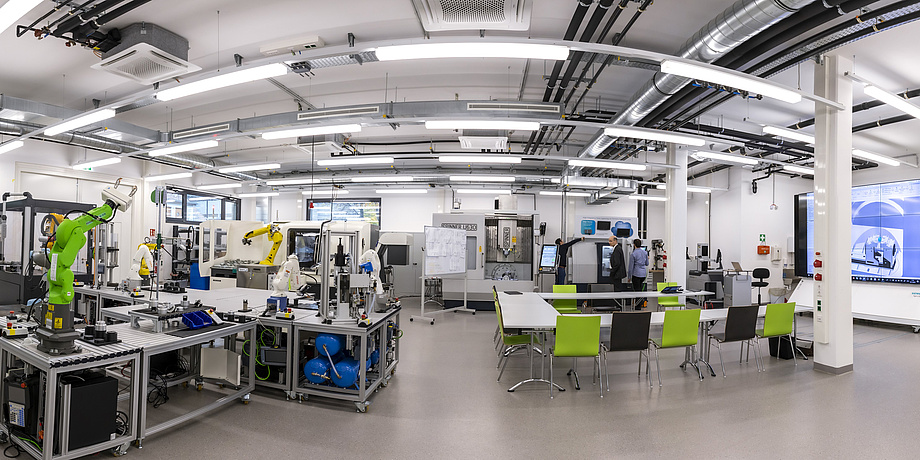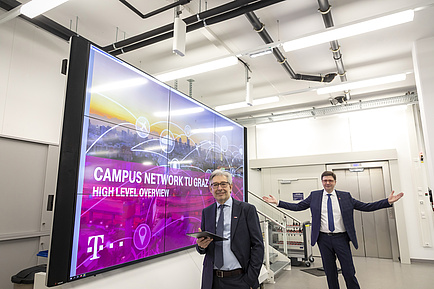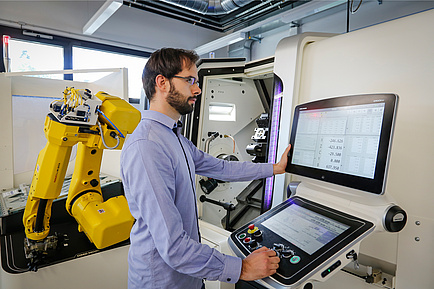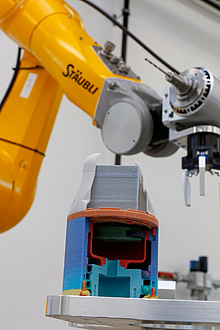Additional pictures for download at the end in the text
Industrial robots from many different manufacturers, state-of-the-art production machines and software solutions for seamless data integration between highly heterogeneous systems for the entire product life cycle, the infrastructure of the research and learning factory at Graz University of Technology (TU Graz) encompasses many aspects that are needed for digital production concepts and technologies of the future. The sought-after research results are open to all sectors and take particular account of small and medium-sized enterprises. However, any interested company has got the opportunity to sustainably develop and test new and individual solutions for smart production in this industrial environment.
"The entire infrastructure was developed practically from scratch; very little was bought from the catalogue," attests Rudolf Pichler. The head of "smartfactory@tugraz" has been responsible for these installations and drove the project forward, this all together with Franz Haas, the head of the Institute of Production Engineering at TU Graz. The nearly four-year taking construction phase will be completed in April when the research and learning factory will go into full operation, although some research work in the pilot factory was started already earlier.
Support from domestic politics, business and industry
Funding to the amount of 4 million euros was provided by the Federal Ministry for Climate Action, Environment, Energy, Mobility, Innovation and Technology (BMK), the Styrian Chamber of Commerce, the State of Styria and the City of Graz. A number of industrial companies also supported the project financially and with man-hours. Among the twenty project partners involved in the set-up are domestic key players such as Siemens, T-Systems, Magenta Telekom, proALPHA, B&R, Magna, Zoller, Tagnology and the Know Center (the complete list of project partners can be found at the end of the article). Together with TU Graz researchers, the companies have already conducted initial preliminary tests in the smart real lab. With Siemens and incubedIT, for example, the dynamic localization of production stations was successfully demonstrated; with T-Systems, a zone model was set up that protects against unauthorized data intrusion; and with proAlpha, data integration of customer requests could be channelled through to the production units for the first time in Austria.
Core topics: agility and data security
The infrastructural highlights include mobile, self-sufficient workstations that demonstrate how agile production processes can be physically implemented. New production lines can be set up quickly via the prototypes of universal units to manufacture new products for rapidly changing markets in short response times. In order to remain competitive, such concepts are increasingly required and must become reality in production.
Furthermore, the 300-square-meter factory is equipped with a campus-owned 5G network. This enables fast, high-volume transmission capacity between the many internet-based applications. A special software package ensures data security by detecting deviations from the usual data streams and triggering an alarm.
Education and training in Industry 4.0
The smartfactory@tugraz is not only an experimental laboratory for industrial companies and SMEs and their industrial developments and innovative ideas, it is also used for education and training. The infrastructure is open to TU Graz students of various fields of study as well as to non-university educational institutions with subject-specific focuses. In addition, the learning factory is a cooperation partner of the FFG training network with focus on Industry 4.0-relevant qualifications and a component of the university course "Leadership in Digital Transformation", which will be offered at TU Graz for the first time starting in autumn 2021.
Didactically prepared showcases
The smartfactory@tugraz also serves as a showroom for external guests such as school classes, helping to answer questions about modern working environments. Digitalization in the manufacturing and assembly sector will be demonstrated along the entire value chain at the demonstration object of an axle drive module for industrial robots. "With the help of this demonstrator, we can present the advantages and challenges of digital manufacturing processes in different showcases and bring the technical facts to life," says Pichler. Examples of such showcases include vendor-independent programming and the associated collaboration of "different language" industrial robots, as well as local, high-frequency data-processing using edge computing (note: unlike cloud services, with edge computing the data does not first have to be forwarded to a server for processing; it can be processed locally).
These vivid examples can be used to convey the digital transformation in industry much more clearly and memorably than previous teaching methods. Haas, the head of the institute is also confident that the research and learning factory at TU Graz will provide an impetus for many research and development projects by local companies and will counteract the shortage of skilled workers in the long term.
smartfactory@tugraz is assigned to the Institute of Production Engineering at TU Graz and is based on an initiative of the Field of Expertise "Mobility and Production", one of five fields of strength of TU Graz.
Facts and figures:
- 300 m2 lab space (with 5G signal, UWB and WLAN)
- 3 CNC machine tools (for the production of high-quality metal components)
- 9 robots from 5 different manufacturers (to study the cooperation of "different language" robots)
- 2 shuttles/ mobile robots, one of them equipped with an additional robot arm
- 1 laser melting system (for metal 3D printing)
- 1 tool measuring station (for precision manufacturing)
- 1 coordinate measuring machine (for precision measurement of components)
- 3 reading stations for RFID applications (for dynamic identification)
- 1 metal 3D printer (for the production of solid special geometries)
- 1 laser marking station (for marking metal components)
Erection/Investment Period: August 2017 – April 2021
Investment volume: 4 million euros
Technologies presented:
- Additive manufacturing (selective laser melting)
- CNC machining (precision manufacturing & hybrid systems)
- Robot collaboration (human-machine and machine-machine interaction)
- Information technology (RFID, OPC-UA, Edge Computing, Cloud Computing)
- Integrated measuring technology
- Data security
- Occupational safety
Project partners (in alphabetical order)
- Anton Paar GmbH
- AUVA
- AVL List GmbH
- B&R Industrial Automation GmbH
- City of Graz
- DMG MORI Austria GmbH
- FESTO GmbH
- GGW Gruber & Co GmbH
- incubed IT GmbH
- Infineon Technologies Austria AG
- Know Center GmbH
- Magenta Telekom (T-Mobile Austria GmbH)
- Magna Powertrain GmbH
- Magna Steyr Fahrzeugtechnik AG & Co KG
- NXP Semiconductors Austria GmbH
- proALPHA Software Austria GmbH
- Siemens Aktiengesellschaft Österreich
- SoliDat Solutions in Data Processing GmbH
- State of Styria
- Styrian Chamber of Commerce
- TAGnology RFID GmbH
- TCM International Tool Consulting & Management GmbH
- T-Systems Austria GesmbH
- Voestalpine Stahl GmbH
- Zoller Austria GmbH



![© Lunghammer – TU Graz [Translate to Englisch:] TU Graz researcher operates collaborative robot arm](https://www.tugraz.at/fileadmin/_processed_/8/e/csm_KollaborativerRoboter_by_Lunghammer-tugraz_5d6039a307.jpg)
![© Lunghammer – TU Graz [Translate to Englisch:] TU Graz researcher operates a 3D coordinate measuring machine](https://www.tugraz.at/fileadmin/_processed_/9/1/csm_Koordinatenmessgeraet-by-lunghammer-tugraz_c5b06612c0.jpg)

